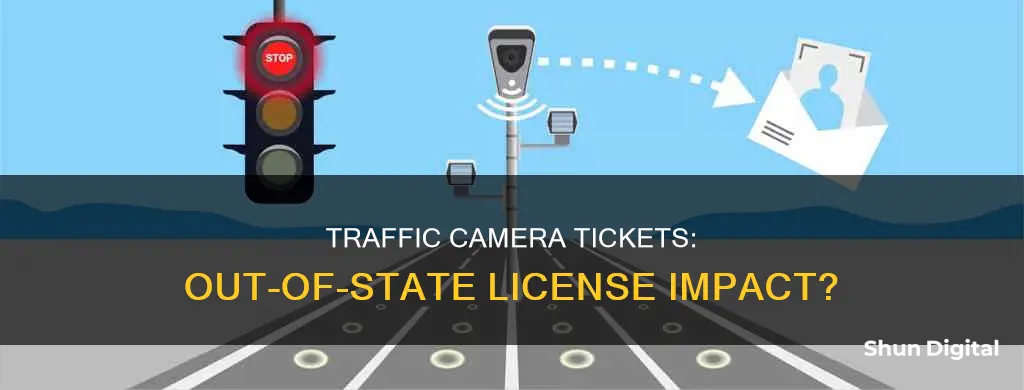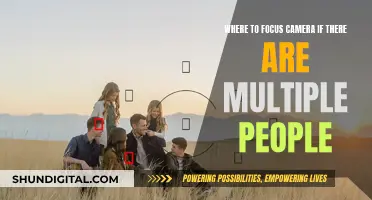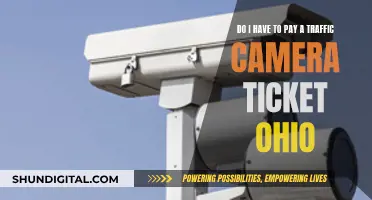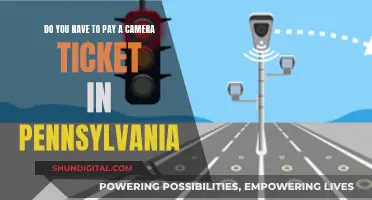
Getting a traffic ticket can be stressful, especially if you're in a different state. But what happens if you're caught speeding or running a red light by a traffic camera when you're out of state? Do out-of-state traffic camera tickets affect your license in the same way as they would if you were at home? The short answer is that it depends on where you live and where you got the ticket.
| Characteristics | Values |
|---|---|
| Nature of the offense | Moving violation or non-moving violation |
| Location of the offense | Out-of-state |
| Driver's home state | A DLC and NVC member state or non-member state |
| Driver's home state actions | Add the offense to the driver's record, assess points, increase insurance rates |
| Driver's options | Pay the fine, contest the ticket, hire an attorney |
What You'll Learn

What is the Driver's License Compact?
The Driver's License Compact (DLC) is an agreement between almost all states in the US to report traffic violations of out-of-state drivers to the licensing authority in the driver's home state. The DLC provides uniformity among member states when exchanging information on convictions, records, licenses, withdrawals, and other data pertinent to the licensing process. The agreement helps ease administrative costs and ensures that each driver nationwide has only one driver's license and one driving record.
The states that are members of the DLC have agreed to report all traffic convictions of out-of-state drivers to the home state of the driver. The Department of Motor Vehicles (or the relevant state agency) then treats the out-of-state conviction as if it had occurred in the driver's home state. This means that the out-of-state violation will affect the driver's record in the same way as an in-state violation. For example, if the home state assesses points for speeding, the licensing authority may add points to the driver's record. However, the fines for the out-of-state violation are collected by the state where the violation occurred.
The DLC is not meant to include non-moving violations like parking tickets, tinted windows, or loud exhaust. It is designed to maximize law enforcement efforts against serious offenses such as drunk driving, vehicle manslaughter, and reckless driving.
All states except Georgia, Massachusetts, Michigan, Tennessee, and Wisconsin are members of the DLC. Tennessee dropped out of the compact in 1997.
Cleaning Camera Battery Acid: Step-by-Step Guide
You may want to see also

How does the Nonresident Violator Compact work?
The Non-Resident Violator Compact (NRVC) is an interstate agreement covering 44 states and Washington D.C., allowing law enforcement to track and enforce traffic violations nationwide. The NRVC was started in the 1970s by a few northern states and has since grown to include almost the entire country.
The NRVC is aimed at drivers who ignore tickets issued by states in which they are non-residents. For example, if a motorist from New Hampshire is cited for speeding in Vermont and chooses not to respond to the ticket (i.e., doesn't pay it), Vermont can notify authorities in New Hampshire, who will then suspend the motorist's driver's license until they take care of the violation in Vermont.
The NRVC also focuses on moving violations, so some traffic infractions like registration, weight limit, and parking violations are not included. DUI offenses, however, are included in the compact. If a motorist commits a DUI in another member state, the compact will apply the home state's vehicle code to the out-of-state offense. This means that if a motorist is convicted of a DUI and has their license suspended in Hawaii, Hawaii will inform the motorist's home state about the DUI conviction and license suspension. As a result, the home state will likely also suspend the motorist's license and may impose additional penalties.
The NRVC standardizes the way states handle non-residents who receive moving traffic violations within their jurisdiction. It allows member states to assist each other with enforcing driving laws and ensures that motorists comply with the laws, ordinances, and regulations relating to the operation of motor vehicles in each jurisdiction. When a motorist is cited in another member state and chooses not to respond to a moving violation, the other state notifies the driver's home state, and the home state will suspend the driver's license until the driver takes care of the matter in the other state.
The NRVC is being superseded by the new Driver License Agreement (DLA), which also replaces the Driver License Compact. As planned by the DLC-NRVC Executive Board, when the Driver License Agreement is ratified by Non-Resident Violator Compact members, the NRVC will no longer be relevant.
How SpyPoint Cameras Behave With Low Battery
You may want to see also

How do you fight an out-of-state ticket?
If you receive an out-of-state traffic ticket, your home state will likely find out about it through the Driver's License Compact (DLC), an agreement between almost every state to report traffic violations that occur out of state to the licensing authority in the driver's home state. All states except Georgia, Massachusetts, Michigan, Tennessee, and Wisconsin are members of the DLC.
If you want to fight an out-of-state ticket, you have a few options:
- Travel to the state: Go to the state where the violation occurred and fight the ticket in person. This option may be inconvenient and costly, especially if the state is far away.
- Fight it in writing: Some states allow you to contest a ticket in writing. You can submit a written appeal explaining your side of the story and why you think the ticket should be dismissed.
- Hire an attorney: If you can't appear in court in person, some states allow you to send an attorney to represent you. They can go to court on your behalf and fight the ticket.
It's important to note that fighting a ticket may result in reduced or waived fines, or even a dismissed charge. However, if you lose your case, you will be responsible for paying the ticket and any associated legal fees, and the infraction may still be added to your driving record.
Charging Your SeaLife Camera: A Step-by-Step Guide
You may want to see also

Do you get points on your license for an out-of-state ticket?
If you get a traffic ticket while driving out-of-state, you are responsible for resolving it. In most cases, your home state will find out about it thanks to the Driver's License Compact (DLC), an agreement between 45 states to report traffic violations that occur out of state to the licensing authority in the driver's home state. According to Ballotpedia, all but five states—Georgia, Massachusetts, Michigan, Tennessee, and Wisconsin—are members of the DLC.
If you are issued a ticket in one of the five states that are not members of the DLC, it is less likely that your home state will find out about it. However, even these states may have other ways of communicating with other states about traffic violations.
The rules for handling out-of-state violations vary, but most states add them to your driving record. In states with point systems for traffic violations, an out-of-state ticket will generally result in points being assessed to your driver's record. However, some states do not add points for out-of-state tickets, so it is important to check the laws in your specific state.
For example, in New Jersey, all violations from another state will incur two points on your license, while in Colorado and Pennsylvania, minor traffic violations (such as speeding) will not be placed on your record at all. Maryland and Nevada opt not to issue points for out-of-state violations but will record the violation. More severe violations, such as DUIs, will generally receive more attention and are more likely to result in points being added to your license.
In addition to points being added to your license, receiving an out-of-state traffic ticket may also impact your auto insurance rates. This will depend on the laws in your state, the severity of the offense, and whether your state allows for insurance increases after a single moving violation.
Iowa Speeding Camera Ticket: Do I Pay or Fight?
You may want to see also

Does your insurance increase with an out-of-state ticket?
Whether or not an out-of-state ticket will increase your insurance depends on several factors. Firstly, it depends on the state where you received the ticket and your home state. In the US, nearly every state is part of the Driver's License Compact (DLC), an agreement to report out-of-state traffic violations to the driver's home state. If your home state is not part of the DLC, it may still have other ways of communicating with other states about traffic violations.
Secondly, it depends on how your home state treats out-of-state violations. Most states will add an out-of-state ticket to your driving record, but some states do not add points for out-of-state tickets.
Thirdly, it depends on your insurance company and your driving history. If the out-of-state ticket is your first violation, your insurance company might choose to forgive the offence and keep it from affecting your rates. However, if you have multiple violations, an out-of-state ticket will likely increase your insurance rates.
It's important to note that even if your insurance rates don't increase, an out-of-state ticket can still have other consequences. You must resolve the ticket with the state where the offence occurred, and failure to pay the fine can result in additional penalties, including the suspension of your license.
Mastering Photography: Understanding P Mode on Your SLR
You may want to see also
Frequently asked questions
You are responsible for resolving the ticket, even if the state that issued it isn't your home state or the state where your vehicle is registered.
In most cases, yes. The Driver's License Compact (DLC) is an agreement between 45 states to share information about traffic violations. If you receive a ticket in one of these states, your home state will be notified. The out-of-state violation will then be treated as if it occurred in your home state and will affect your driving record accordingly.
If you don't pay an out-of-state ticket, your license may be suspended until the fine is paid. This is enforced through the Nonresident Violator Compact (NVC), an agreement between states (except Alaska, California, Michigan, Montana, Oregon, and Wisconsin) to notify each other about unpaid out-of-state fines.







